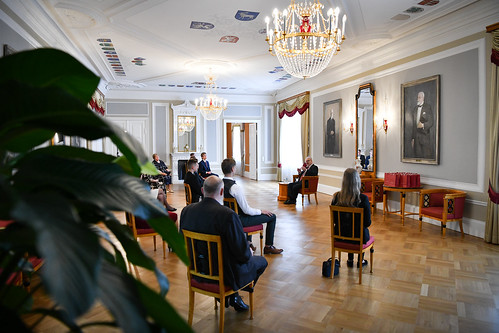‘The idea of Democracy Week events was conceived here in the Riga Castle and it came from different non-governmental actors, including young people, who were invited here for a public conversation about solidarity. They suggested that we should celebrate democracy. This idea was received with keen enthusiasm and soon evolved into a Democracy Week, a week in May that is similar to Patriot Week in November. It is extremely important that you chose to take part in Democracy Week essay writing contest. We should not take democracy for granted as we sometimes do. As you have alluded to in your essays, Latvia did not appear from thin air. We had to fight for it. There had to be this ambition. And then we had to defend our democracy, and we still do to this day. Unprotected democracy will soon collapse. I am happy to see that you have explored your family roots in your essays. State is an abstract concept. Without people, state is only a shell. History of a state is the history of its people: your history, a history that binds people together. We see that vividly in your essays,’ said President of Latvia Egils Levits addressing the youngsters and their teachers.
President and pupils discussed challenges of modern democracy and various ways of strengthening democratic systems. According to pupils, major threats come not only from disinformation and populism, but also lack of critical thinking and participation. They emphasised that ‘democracy requires thinking, engagement, civic participation and education’. After the meeting with President of Latvia, pupils and their teachers went on a tour of the Riga Castle.
Democracy Week essay writing competition was held from 19 April – 4 May. It was open to students and pupils who wanted to share their views on what our ancestors expected of the state of Latvia 100 years ago and during the Awakening, and what they expect from Latvia today. Contestants could choose between 140-character long essay, which is the length of a Twitter message, and a full page long essay. Essays submitted by pupils and students were evaluated by professors at leading universities and History and Social Science Teachers’ Association. Winners of the competition could choose a politician they wanted to meet, and six winners chose to meet with President Levits.





